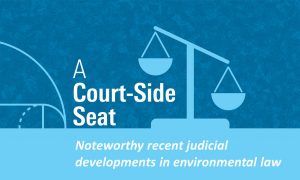 In a mixed decision for international investors, the International Centre for Settlement of Investment Disputes (ICSID) recently published a tribunal’s award finding that the Republic of Colombia breached its obligations under the Canada-Colombia Free Trade Agreement when it blocked Eco Oro Minerals Corporation’s mining project in an effort to protect a high-altitude wetland known as the Santurbán Páramo but held that Colombia did not indirectly expropriate Eco Oro’s concession contract with the government pursuant to which Eco Oro’s investment was made because its actions were a legitimate exercise of Colombia’s right as sovereign state to protect its environment. ICSID arbitration, as its name implies, exclusively deals with international commercial disputes, where “investors” (as defined by applicable treaties and include both companies and individuals) submit claims under international treaties against foreign governments. The Eco Oro decision and its underlying analysis are not unique to investor-state arbitration and illustrate how domestic policy concerns, such as the protection of the environment, may result in States acting against the interests of foreign commercial investment.
In a mixed decision for international investors, the International Centre for Settlement of Investment Disputes (ICSID) recently published a tribunal’s award finding that the Republic of Colombia breached its obligations under the Canada-Colombia Free Trade Agreement when it blocked Eco Oro Minerals Corporation’s mining project in an effort to protect a high-altitude wetland known as the Santurbán Páramo but held that Colombia did not indirectly expropriate Eco Oro’s concession contract with the government pursuant to which Eco Oro’s investment was made because its actions were a legitimate exercise of Colombia’s right as sovereign state to protect its environment. ICSID arbitration, as its name implies, exclusively deals with international commercial disputes, where “investors” (as defined by applicable treaties and include both companies and individuals) submit claims under international treaties against foreign governments. The Eco Oro decision and its underlying analysis are not unique to investor-state arbitration and illustrate how domestic policy concerns, such as the protection of the environment, may result in States acting against the interests of foreign commercial investment.
Real Estate & Construction News Round-Up 12/01/21
Investment firms turn their attention towards acquiring digital land, China works to manage its real estate debt, the European Union announces a multibillion-euro infrastructure bill, and more.
A Court-Side Seat: OSHA, Air and Waters
The courts have issued several new and significant rulings on environmental and administrative law the past few weeks.
U.S. COURT OF APPEALS FOR THE DISTRICT OF COLUMBIA CIRCUIT
Truck Trailer Manufacturers Association, Inc. v. EPA
On November 12, 2021, the DC Circuit held in a divided ruling that neither Section 202(a)(1) of the Clean Air Act nor the Energy Independence and Security Act of 2017 authorized these agencies to regulate the greenhouse gas emissions released by trailers pulled by tractors—most commonly, the 18 wheelers that carry many products to market on the nation’s highways. According to the court, trailers have no motor, and therefore cannot be subject to the Greenhouse emissions and fuel efficiency standards promulgated in 2016. (See 81 FR 73478.) The majority, after an exacting review of these statutes, determined that the Clean Air Act did not authorize that portion of EPA’s rule insofar as it applies to heavy-duty trailers, and since the Energy Independence Act concentrates on fuel economy, and trailers use no fuel, there was also no authority for the NHTSA to employ. Judge Millett agreed with the majority regarding the EPA rules but would hold that the NHTSA’s inclusion of commercial trailers in its fuel efficiency rule was a reasonable interpretive judgment that “falls squarely within its statutory delegation.”
Chairman of the Senate Committee on Banking, Housing and Urban Affairs Calls for CFPB Investigation into Tenant Screening Businesses
 Senator Sherrod Brown (D-OH), Chairman of the Senate Committee on Banking, Housing, and Urban Affairs, has written to newly confirmed Consumer Financial Protection Bureau (CFPB) Director Rohit Chopra, asking him to review companies in the tenant screening industry for possible Fair Credit Reporting Act violations and other violations of U.S. laws. The CFPB, for its part, has already published a bulletin alerting Consumer Reporting Agencies (CRAs) and other furnishers of consumer information that, as federal, state and local pandemic-related housing protections expire, the Bureau will be giving greater enforcement focus to these businesses’ compliance with accuracy and dispute obligations under the Fair Credit Reporting Act (FCRA) and Regulation V. While it is still unclear whether Director Chopra will direct the Bureau to investigate specific businesses flagged by Chairman Brown, the tenant screening industry will likely face increased scrutiny in the coming months, which may impact their service offerings and cause interruptions for landlords relying on these businesses and services.
Senator Sherrod Brown (D-OH), Chairman of the Senate Committee on Banking, Housing, and Urban Affairs, has written to newly confirmed Consumer Financial Protection Bureau (CFPB) Director Rohit Chopra, asking him to review companies in the tenant screening industry for possible Fair Credit Reporting Act violations and other violations of U.S. laws. The CFPB, for its part, has already published a bulletin alerting Consumer Reporting Agencies (CRAs) and other furnishers of consumer information that, as federal, state and local pandemic-related housing protections expire, the Bureau will be giving greater enforcement focus to these businesses’ compliance with accuracy and dispute obligations under the Fair Credit Reporting Act (FCRA) and Regulation V. While it is still unclear whether Director Chopra will direct the Bureau to investigate specific businesses flagged by Chairman Brown, the tenant screening industry will likely face increased scrutiny in the coming months, which may impact their service offerings and cause interruptions for landlords relying on these businesses and services.
Real Estate & Construction News Round-Up (11/17/21)
President Biden signs the bipartisan infrastructure bill into law, plants like hemp and algae could help minimize the environmental footprint of high-rise buildings, construction groups sue over the Occupational Safety and Health Administration’s (OSHA) new vaccine rule, and more.
A Court-Side Seat: Rulemaking Proposed, Comments Solicited
We interrupt our usual scrutiny of the courts to focus (mostly) on the important developments in notices and rulemaking issued by and concerning federal regulatory agencies and departments in the past several weeks.
Connection Corner: Joe Rich of The Related Companies
The Real Estate and Construction industry may be huge, but ultimately, as with all industries, it comes down to the people who help make it all come together. From time to time, we like to profile some of those people.
 Joe Rich is CIO and a senior vice president at The Related Companies, an owner, operator and fund manager of real estate based in New York City. Rich has been with Related for five years as the CIO. Prior to that, he was CIO at New York-based real estate developer Tishman Speyer.
Joe Rich is CIO and a senior vice president at The Related Companies, an owner, operator and fund manager of real estate based in New York City. Rich has been with Related for five years as the CIO. Prior to that, he was CIO at New York-based real estate developer Tishman Speyer.
House Passes $1.2 Trillion Infrastructure Investment and Jobs Act
Enactment of the massive infrastructure package creates funding opportunities as federal agencies prepare to award funds across a large swath of U.S. sectors and industries, including energy, broadband, water, transportation, electric vehicles and cybersecurity. On November 5, 2021, the U.S. House of Representatives passed the Infrastructure Investment and Jobs Act, a major infrastructure spending bill, which President Biden is expected to sign into law. The package includes $1.2 trillion for roads, bridges, electric vehicles, broadband, cybersecurity, water resilience and drinking water upgrades, and grid resilience, and other infrastructure priorities. Colleagues Nancy A. Fischer, Aimee P. Ghosh, Benjamin J. Cote, Elizabeth Vella Moeller, Craig J. Saperstein, Moushami P. Joshi, and More detailed analyses on specific items in the bill will be available in the coming days and weeks at Pillsbury’s American Infrastructure Investment Resource Center (pillsburylaw.com).
Real Estate & Construction News Round-Up (11/10/21)
The House of Representatives passes the Senate version of the Infrastructure Investment and Jobs Act (IIJA), the construction industry continues to struggle with labor shortages, effects of climate change put the built environment at risk, and more.
Real Estate & Construction News Round-Up (11/03/21)
Amenity-rich buildings become a key focus in enticing employees back into the office, supply chain links are strained by a lack of storage capacity in warehouses and port areas, green lease signings are on the uptick, and more.





